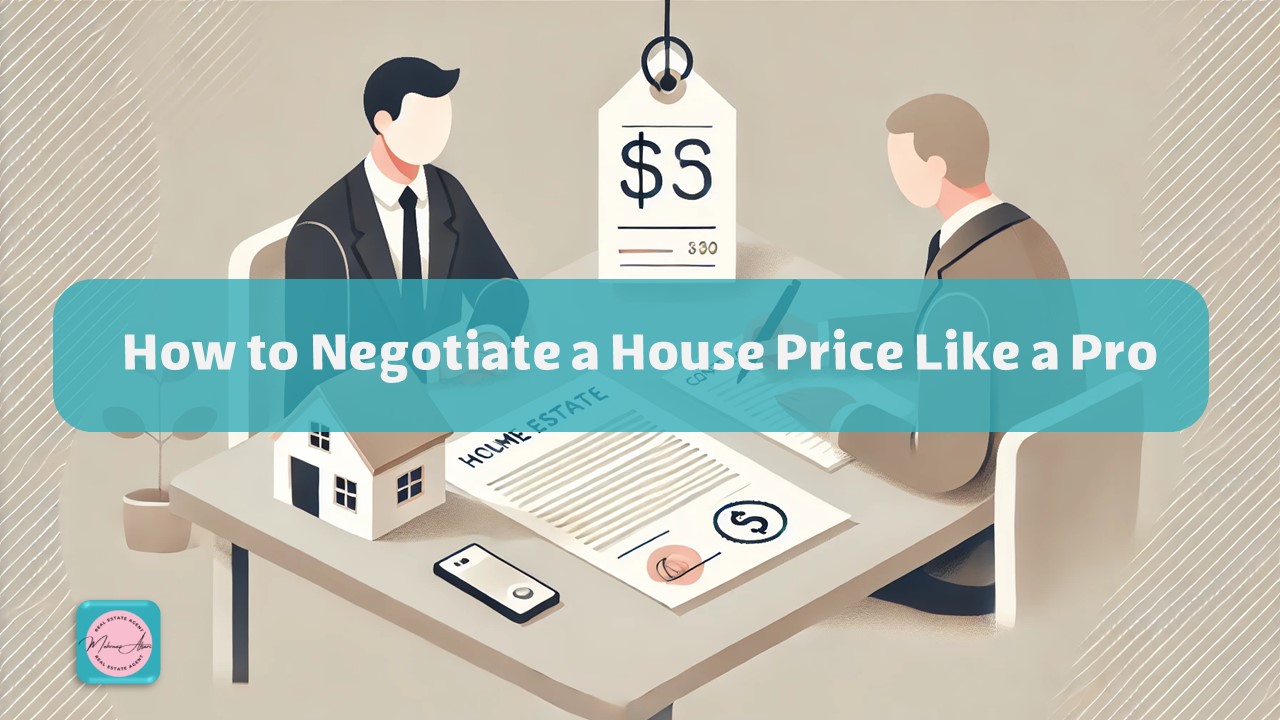Buying a house is one of the biggest financial transactions you’ll make in your lifetime. Yet, many buyers hesitate to negotiate, fearing they might lose the deal. However, with the right strategy for negotiating a house price, you can save thousands of dollars while securing your dream home. In this guide, we’ll cover expert tips on how to negotiate a house price like a pro and maximize your savings.
1. Do Your Research Before Making an Offer
Knowledge is power when it comes to negotiating a home price. Before entering negotiations, gather as much information as possible:
Market conditions: Is it a buyer’s or seller’s market? In a buyer’s market, you have more leverage, while in a seller’s market, negotiating may be tougher.
Comparable sales (comps): Research recent sales of similar homes in the area to understand a fair price range.
Property history: Check how long the home has been on the market. Homes that sit unsold for months may indicate overpriced listings.
Seller motivation: Understanding the seller’s urgency can give you an advantage. If they need to move quickly, they may accept a lower offer.
2. Get Pre-Approved for a Mortgage
Getting pre-approved is one of the most proactive steps you can take before entering the housing market. It gives you a clear understanding of your financial boundaries and lets sellers know you’re serious and capable of closing the deal.
From the perspective of negotiating a house price, having a mortgage pre-approval shifts leverage in your favor. Sellers are far more likely to respond positively to an offer backed by a lender’s confirmation, which makes negotiations more efficient and can even help you secure better terms.
Sellers take offers from pre-approved buyers more seriously. A pre-approval letter shows you have the financial means to close the deal, giving you an edge in negotiations. It also helps you determine your budget and avoid overpaying.
Having a pre-approval not only streamlines the process but also sets a confident tone when negotiating a house price. Sellers feel more secure dealing with buyers who present proof of financial backing, which can lead to smoother and more favorable discussions. When negotiating a house price, this level of financial readiness often puts you ahead of other buyers who haven’t taken this step.
3. Start with a Competitive but Strategic Offer
Your initial offer should be reasonable yet leave room for negotiation. Consider:
Starting lower but not too low: A significantly lowball offer can offend the seller and stall negotiations.
Adding favorable terms: A clean offer with fewer contingencies (e.g., flexible closing date) may be more attractive than a slightly higher offer with conditions.
Being prepared for counteroffers: Most sellers won’t accept the first offer outright, so expect back-and-forth discussions.
READ MORE: Best Places to Live in Las Vegas
4. Use Inspection Results to Your Advantage
A home inspection can reveal issues that may justify a price reduction. If significant repairs are needed, you have three options:
Negotiate a lower price to account for repairs.
Request the seller to fix the issues before closing.
Ask for closing cost credits to offset repair costs.
This is one of the most effective negotiation tools, as sellers are often more willing to negotiate rather than deal with repairs themselves.
5. Leverage Multiple Offers (When Applicable)
If you’re considering more than one property, use this as leverage. Let the seller know you have other options, which may encourage them to lower their price or offer better terms to secure your purchase.
In the context of negotiating a house price, this approach can be especially powerful. Demonstrating that you’re a discerning buyer with multiple possibilities signals to sellers that you’re not desperate or locked into their property. This perception can lead them to make more competitive offers or show flexibility they might not otherwise reveal.
6. Understand Seller Concessions and Incentives
Price isn’t the only thing up for negotiation. You can ask for:
Closing cost assistance (common in buyer’s markets).
Inclusion of appliances, furniture, or fixtures.
Home warranty coverage for the first year.
These concessions can save you money in the long run, even if the final sale price doesn’t drop significantly.
7. Be Ready to Walk Away
One of the most powerful negotiation tactics is being willing to walk away. If the seller won’t budge and the deal isn’t right for you, don’t be afraid to move on. There are always other properties, and being too eager can weaken your position.
This principle becomes even more impactful when negotiating a house price. Walking away shows confidence and establishes your boundaries clearly, which can often prompt sellers to reconsider their stance. It’s a subtle yet firm reminder that the power balance doesn’t rest entirely with the seller, giving you a stronger position in the negotiation process.
8. Work with an Experienced Real Estate Agent
A skilled real estate agent understands local market trends, negotiation tactics, and seller psychology. They can advocate for you and structure offers strategically, ensuring you get the best deal possible.
9. Time Your Offer Strategically
Timing can impact your negotiation power:
Winter months often favor buyers, as fewer people are shopping for homes.
End-of-month or quarter deals may benefit you, as sellers (or developers) might be motivated to close deals quickly.
Homes lingering on the market for a long time may be prime candidates for negotiation.
10. Be Professional and Respectful
Negotiations should always remain professional. Building rapport with the seller and their agent can work in your favor, making them more willing to negotiate.
When negotiating a house price, a respectful tone can make all the difference. Sellers are more inclined to cooperate and make concessions when they feel valued and understood. This atmosphere of mutual respect often leads to smoother and more successful negotiations.
11. Make a Strong Earnest Money Deposit
An earnest money deposit (EMD) is a sign of good faith and can give you an edge in negotiations. Offering a higher EMD can make your offer more attractive compared to other buyers.
When negotiating a house price, including a generous EMD demonstrates that you’re a committed and serious buyer. This act of financial assurance often reassures sellers and can influence them to choose your offer over others. In tight markets, such signals of reliability can be a decisive factor.
12. Know the Art of Counteroffers
After making your initial offer, expect counteroffers. When negotiating:
Stay firm on key points but be flexible on minor details.
Keep emotions in check and focus on the numbers.
Ask for a written breakdown of counteroffers so you can review them carefully.
13. Avoid Common Negotiation Mistakes
Buyers often make mistakes that can hurt their chances of a good deal. Some pitfalls to avoid include:
Being too aggressive: Negotiation is a give-and-take process, and being overly aggressive may turn off the seller.
Failing to do your research: Not understanding market values can lead to overpaying or making unrealistic offers.
Rushing the process: Take your time to review all terms and make informed decisions.
14. The Role of Escalation Clauses
If you’re in a competitive bidding situation, consider using an escalation clause. This clause automatically increases your offer up to a certain limit if another buyer outbids you. It ensures you remain competitive without overpaying unnecessarily.
This tactic can be especially useful when negotiating a house price in a hot market where multiple offers are common. It allows you to remain flexible while protecting your budget ceiling, giving you a tactical edge in fast-paced negotiations.
15. Post-Negotiation Considerations
Once negotiations are successful, be prepared for the final steps:
Review all contract terms carefully before signing.
Work with your lender to finalize financing.
Schedule a final walkthrough to ensure the property is in the agreed-upon condition before closing.
Conclusion
Negotiating a home price is an art that requires preparation, patience, and strategy. By researching market conditions, leveraging inspections, and working with a real estate professional, you can confidently negotiate a better deal. Remember, the worst a seller can say is “no”—so don’t be afraid to ask for what you want.
This entire process underscores the importance of negotiating a house price with a plan rather than relying on luck or impulse. Whether it’s leveraging your pre-approval, timing your offer, or presenting a strong earnest money deposit, each step adds value to your negotiation strategy. Becoming familiar with these tactics increases your control and positions you more favorably in the eyes of sellers.
By following these steps, you’ll increase your chances of securing your dream home at the best possible price. Happy house hunting!
FAQs
What is the best way to negotiate a house price?
Research market conditions, start with a strategic offer, use inspection results, and work with an experienced agent.
How much lower should I offer on a house?
Typically, offering 5-10% below asking price is reasonable, but this depends on market conditions and seller motivation.
Can I negotiate house price after inspection?
Yes, if significant issues are found, you can negotiate a lower price, request repairs, or ask for closing cost credits.
What mistakes should I avoid when negotiating?
Avoid lowballing, being too aggressive, skipping research, and rushing the process—these can weaken your position.





